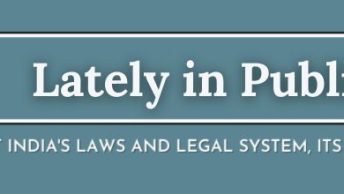A fortnightly feature inspired by I-CONnect’s weekly “What’s New in Public Law” feature that addresses the lacuna of a one-stop-shop public law newsletter in the Indian legal space.
What’s new at LAOT
1. Aditya Prasanna Bhattacharya, Uniform Civil Code: A Dispassionate Constitutional History Part I and II (revisits the UCC’s roots in the Constituent Assembly debates and traces its evolution within India’s legal framework. Emphasizes moving beyond debates on whether the UCC is legitimate or politically motivated, advocating for reforming archaic family laws)
2. Vrinda Chaturvedi, Bulldozer Action: Leaving Victims of Justice in the Rubble (critiques the lack of timely compensation and judicial remedies for victims of demolitions. Concludes by placing the burden of safeguarding rights on all three branches of the State)
3. Yash Dahiya, Reconsidering the Prohibition on Advertising Policy for Lawyers Part I and II (Discusses the Madras HC’s upholding of the prohibition on lawyer advertisements, arguing that it disproportionately impacts first-generation lawyers and calls for less restrictive regulations)
4. Tanya Sara George and Abhishek Sanjay, Blurring Boundaries: Could the MRE Apply to Live-In Relationships? (examines whether the Marital Rape Exception (MRE) could extend to live-in relationships due to existing legal protections)
Elsewhere Online
1. Saumya Jaju, The Long Fight for Accessibility and Dignity in Indian Prisons, Vidhi Legal Policy Blog
2. Shreedhar S Joshi, The Maharashtra Anti-Superstition Act: Reasonable or Arbitrary, Vidhi Legal Policy Blog
3. Gautam Bhatia,All the World’s a Stage: On the Legacy of Chief Justice D.Y. Chandrachud, Constitutional Law and Philosophy
4. Gautam Bhatia, Better Late than Never: The Supreme Court’s Bulldozer Guidelines Judgment, Constitutional Law and Philosophy
5. Mokshit Byri, Speaker’s Inaction No Longer Immune: Telangana High Court’s Purposive Lens on Judicial Review Over Speaker’s Delay in Anti-Defection Pleas,CLS Blog NLU Odisha
Listen Up
1. Shekhar Gupta, CutTheClutter, ThePrint (discusses the SC’s judgment in the Bulldozer case and its broader implications)
2. Kushagr Bakshi, Constitutional Interpretation and the Transformation of Federalism Ideas of India (examines federalism in the Indian Constitution through the lens of pluralism)
3. 3 Things Podcas by Express Adda, The 50th Chief Justice of India, DY Chandrachud (except from the interview of Rtd. CJI who reflects on his career and legacy)
4. Douglas McDonald-Norman, Refugee Law and intersection of Australian and Indian Scholarship, Law and Other Things Podcast (Discusses Indian refugee law, including the Rahim Ali v. State of Assam case)
5. Sonalde Desai, Census and delimitation what’s going to happen in India’s South India, In Focus by The Hindu (discuss the drawbacks of proposed delimitation exercise and if there are a fairer system to ensure adequate representation without penalising States that have performed better)
Lately in Academic Articles
1. Alok Prasanna Kumar, Excavating the ‘Minority Character’ of an Institution, Economic and Political Weekly (discussing the constitutional and legal ambiguity surrounding the status of Aligarh Muslim University as a “minority institution” in light of the Supreme Court’s decisions in S Azeez Basha v Union of India (1968) and Aligarh Muslim University v Naresh Agarwal (2024), with the latter leaving the definitive determination of AMU’s status to a future bench).
2. Sophy K.J. & Devanshi Saxena, “Can you ban the bees from the honey?”, Taylor & Francis Online (proposes an integrated legal framework combining the Scheduled Tribes and Other Traditional Forest Dwellers (Recognition of Forest Rights) Act 2006 and the Geographical Indications of Goods Act 1999, advocating for community agency, labour protections, and sustainable commercialization of non-timber forest produce).
3. Kaushik Bhattacharya et al., “Liticaphobia” of Surgeons and Bharatiya Nyaya Sanhita Act, Indian Journal of Surgery (analyzing the implications of the Bharatiya Nyaya Sanhita Act 2023 on surgeons, focusing on the impact of provisions penalizing medical negligence on surgical decision-making and the emergence of “liticaphobia” among practitioners).
4. Sukhpal Singh, Punjab’s Draft Farm Policy: Missing Markets for the Cooperative Model, Economic and Political Weekly (analyzes the recommendations of Punjab’s long-awaited agricultural draft policy, formulated after three decades of agrarian crisis, highlighting its major proposals and identifying critical weaknesses in addressing the challenges faced by the state’s farming sector).
5. Ayush Yadav & Avani Verma, Transgender’s Rights in India: A Comparative Study, Nyaayshastra Law Review (analyzing the legal and societal strides toward transgender equality in India, including the landmark 2014 Supreme Court ruling affirming self-identified gender, the Transgender Persons Bill 2018, and persisting challenges of discrimination and stigmatisation, while incorporating comparative insights from Nepal, Thailand, and Australia to propose tailored reforms for India).
Opportunities and other things
1. Call for abstract by International Seminar on Shaping the Future: Law, Policy and the Digital Revolution of RMLNLU, Lucknow. The last date to submit the abstract is December 27, 2024.
2. Call for paper by 3rd National Seminar on Affordable Housing by NLU Delhi. The last date to submit is December 31, 2024.
3. Call for abstract by Global Dialogue on India’s Emerging Criminal Law Framework. The last date to submit the abstract is January 5, 2025.
4. Call for abstract by International Conference on “Navigating the Future: Industrial Policy and Global Competitiveness” by NALSAR. The last date to submit the abstract by January 17, 2025.
5. Call for Papers by NLSIU’s Socio-Legal Review (SLR) Journal. The last date to submit is January 30, 2025.
6. Call for papers by National Law School of India Review Vol. 37(1). The last date to submit is February 2, 2025.
This newsletter is created by Archita Satish, Harshitha Adari and Jeetendra Vishwakarrma from LAOT Blog with the guidance of Surbhi Karwa and Anubhav Kumar.





Barınaktan, sokaktan ya da gönüllülerden sahiplendirilen sevimli dostlarımız sahipleniyorum.com’da sizi bekliyor. Hayvanseverler için hazırlanan modern arayüzü ve hızlı filtreleme seçenekleriyle aradığınız dostu kolayca bulun.